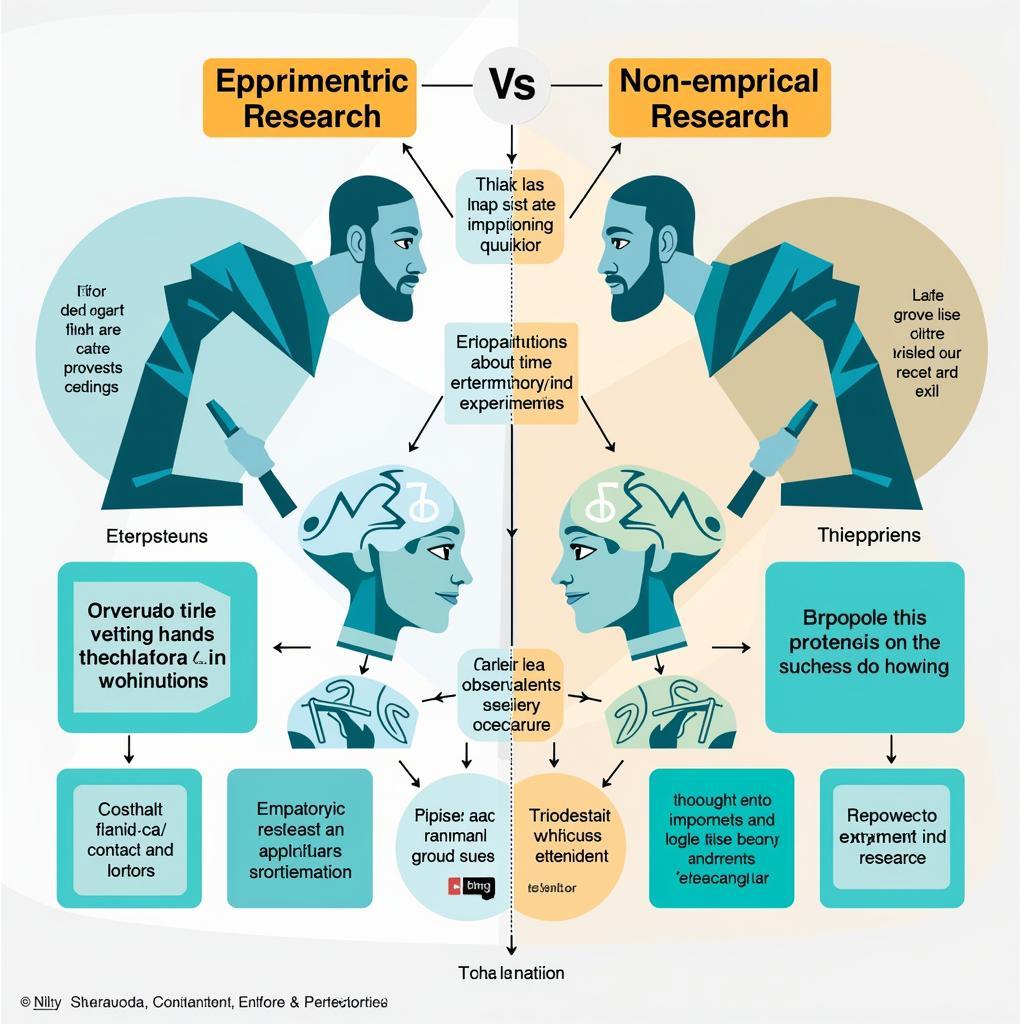The pursuit of understanding the paranormal often leads us down winding paths of inquiry, prompting us to consider different approaches to research. Two such approaches, empirical and non-empirical research, form the cornerstones of investigation into the unknown. By understanding the differences between these methodologies, we can better evaluate the evidence presented for paranormal phenomena.
 Empirical vs. Non-Empirical Research Methods
Empirical vs. Non-Empirical Research Methods
Delving into the Observable: Empirical Research
Empirical research, often considered the bedrock of scientific inquiry, hinges on direct observation and experimentation. This method involves gathering data from the real world through our senses or specialized instruments. Imagine a researcher attempting to study a haunted location. They might use EMF meters to detect electromagnetic fluctuations, record temperature changes, or capture audio and video evidence of unexplained phenomena.
 Empirical Research Tools for Paranormal Investigation
Empirical Research Tools for Paranormal Investigation
This data-driven approach allows researchers to draw conclusions based on tangible evidence. However, applying empirical methods to the study of the paranormal presents unique challenges. The elusive nature of paranormal phenomena, often resistant to controlled environments and replication, makes gathering consistent, verifiable data difficult.
Exploring the Abstract: Non-Empirical Research
Non-empirical research, in contrast, delves into the realm of abstract concepts and theories. This approach relies heavily on logic, reasoning, and argumentation to arrive at conclusions. For instance, a researcher might analyze historical accounts of a haunted location, examining patterns, connections, and potential explanations rooted in folklore, psychology, or cultural beliefs.
While non-empirical research may not provide the concrete, measurable data of its empirical counterpart, it offers valuable insights into the human experience of the paranormal. This approach acknowledges the subjective nature of many paranormal encounters and the influence of cultural contexts on interpretations of these experiences.
Bridging the Divide: Integrating Research Approaches
The inherent strengths and limitations of both empirical and non-empirical research highlight the need for a multifaceted approach to studying the paranormal. By combining meticulous data collection and analysis with thoughtful consideration of historical context, cultural influences, and psychological factors, we can strive for a more comprehensive understanding of these enigmatic phenomena.
For instance, an investigation into a supposed haunting could involve collecting empirical data on environmental anomalies while also exploring historical records, interviewing witnesses, and considering psychological explanations for perceived experiences.
Which Approach Reigns Supreme?
The question isn’t about crowning one approach superior but recognizing the value of both in unraveling the mysteries of the paranormal. Empirical research provides a framework for objective observation and measurement, while non-empirical research allows us to delve into the nuances of human experience and interpretation.
Ultimately, it’s through the synthesis of these approaches that we can hope to shed light on the shadowy corners of our world, moving beyond mere speculation towards a more informed and nuanced understanding of the paranormal.
FAQs: Empirical vs. Non-Empirical Research in Paranormal Investigation
1. Can empirical research definitively prove or disprove the existence of ghosts?
While empirical research can offer compelling evidence, the inherent difficulties in studying elusive phenomena like ghosts make definitive proof challenging. Empirical data can support or challenge existing theories but may not offer absolute confirmation.
2. Is non-empirical research less valuable than empirical research in paranormal investigation?
Not necessarily. Non-empirical research provides crucial context and explores the human element of paranormal experiences. It considers cultural influences, psychological factors, and historical interpretations, offering valuable insights often overlooked in purely data-driven approaches.
3. How can I determine if a paranormal study is credible?
Look for transparency in methodology, data collection, and analysis. Consider the researcher’s credentials, potential biases, and whether the study employs a balanced approach incorporating both empirical and non-empirical methods.
4. Can personal experiences be considered empirical evidence?
Personal experiences, while valuable for understanding individual perceptions, are considered subjective and not typically considered reliable empirical evidence.
5. What are some examples of non-empirical research methods used in paranormal studies?
Non-empirical methods include analyzing historical texts, folklore, and mythology, conducting interviews and case studies, and exploring psychological and sociological aspects of paranormal beliefs and experiences.
Need help exploring a paranormal mystery? Our team of experts at Paranormal Research is here to help! Contact us at 0904826292, email us at research@gmail.com, or visit our office at No. 31, Alley 142/7, P. Phú Viên, Bồ Đề, Long Biên, Hà Nội, Việt Nam. We are available 24/7 to assist you.